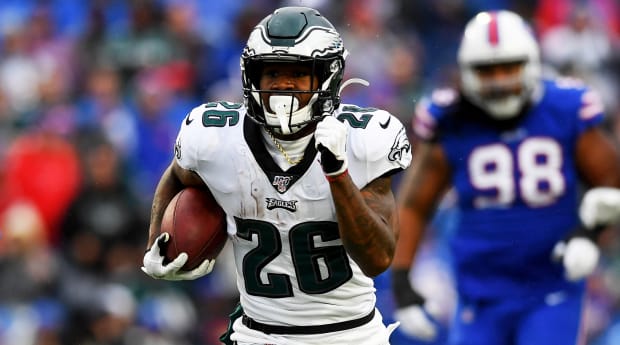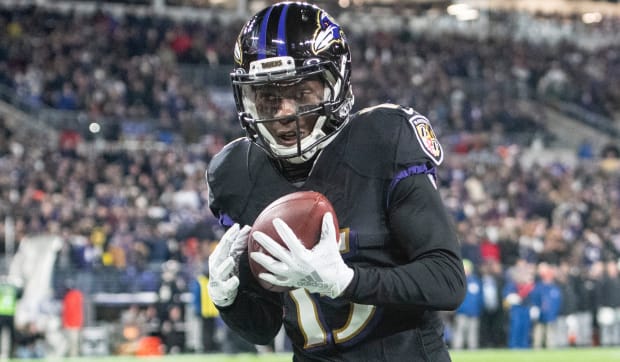These six players are in trouble of not meeting the fantasy football expectations of their average draft position
In fantasy football, players are deemed busts or breakouts. There’s not much middle ground — so let’s find it.
Here are six players who will not live up to their average draft position (ADP) in 2021. A team change, scheme change, or newfound competition for touches will prevent these players from making their ADP worth it. They're not surefire busts, but there are reasons to stay away from each of them, or at least wait an extra round or two when it comes time to draft your team.
Kyler Murray, QB, Arizona Cardinals
Murray believes his legs should be a luxury, and the Cardinals' game plan down the stretch last season supports that notion. If 2021 resembles the second half of 2020, Murray will have difficulty living up to his ADP as QB3. So much of his fantasy value was derived from his rushing ability. He ran the ball nearly half as often in the final eight games of the season compared with the first eight, and as his carries decreased, so did his overall fantasy production.
The Cardinals’ offseason moves coincide with Murray running less. Arizona is going in a new direction in the backfield with Chase Edmonds replacing Kenyan Drake. James Conner was signed as a backup. Bringing in A.J. Green and drafting Rondale Moore gives Murray additional receiving options beyond DeAndre Hopkins. And Arizona traded for center Rodney Hudson, an elite pass protector, to keep its quarterback safe. Murray might take another leap as a quarterback in Year 3, but there’s reason to avoid spending an early-round pick on a dual-threat quarterback who’s planning on running less.
Miles Sanders, RB, Philadelphia Eagles

Sanders has newfound competition for touches in Philly. In the three games Jalen Hurts and Sanders played together last season, Sanders had only eight more carries than the Eagles' new full-time starting quarterback, and that was when Sanders had full autonomy in the running back room. Philadelphia brought in Kerryon Johnson off waivers and spent a fifth-round pick on Memphis' Kenneth Gainwell this offseason. Johnson is a depth addition, But Gainwell is the third-down pass-catching threat that the Eagles need.
Sanders missed four games in his sophomore season, caught just over 50% of his targets, and a trio of huge runs anchored his RB21 finish. Not to knock Sanders for ripping off runs of 74, 74, and 82 yards, but those huge pickups were massive outliers and accounted for more than a quarter of his rushing yards. He only had one other run of 20 yards for four on the season — tied with Conner. Sanders has never finished top 20 in carries, and his receiving work figures to decline, too. The volume simply won’t be there for Sanders to support his Round 3 ADP.
Melvin Gordon III, RB, Denver Broncos
Gordon was a fringe RB1 his first season in Denver. Gordon was ninth in the NFL in carries and rushing yards and had full control of the backfield, getting nearly 100 more carries than his backup. These are all good things for Gordon and his career, except the Broncos traded up to draft North Carolina running back Javonte Williams early in the second round.
Williams exploded his junior season for more than 1,400 yards from scrimmage and 22 touchdowns despite splitting carries with Jets fourth-rounder Michael Carter. There’s a belief that Gordon may be the starter in name, but Williams may lead the team in yards and carries, according to the Denver Post. Williams was top 10 in the NCAA in yards per carry and had the most carries of those backs. Williams is going eight spots lower than Gordon. If he even cuts into Gordon's volume, spending a fifth-round pick on Gordon will be hard to stomach. And if Williams is the lead back in Denver, Gordon will be a real bust in the top half of your draft.
Marquise Brown, WR, Baltimore Ravens

Brown is the Ravens' top receiving option, but he gets less volume than some other teams’ second and third options. It’s not entirely Brown’s fault — his 25% target share only added up to 100 targets in 2020 because of Baltimore’s affinity for running the ball. He already competes with tight end Mark Andrews for targets, and the Ravens’ receiver room was bolstered this offseason by the addition of veteran Sammy Watkins and rookies Rashod Bateman and Tylan Wallace.
Russell Gage and Michael Gallup outpaced Brown in receiving yards; Jakobi Meyers and Darnell Mooney had more receptions than Brown, and Jerry Jeudy and Cole Beasley finished with more targets than Brown. Currently, all of those players are being drafted lower than him. The third-year receiver's fantasy performance was anchored by his eight touchdowns catches, and still, he finished as the WR35. With a deeper receiving corps in Baltimore, Brown's already borderline WR3 production is bound to drop.
D.J. Chark Jr., WR, Jacksonville Jaguars
Chark led the Jaguars in targets in 2020 despite playing 13 games. That won't happen again if he misses time this season. Chark is still the team's No. 1 receiver, but the stranglehold he had on the target share will be much looser. This summer, Jacksonville signed Marvin Jones Jr. and drafted running back Travis Etienne Jr., Trevor Lawrence's college teammate, in the first round. Both figure to cut into Chark's targets. Laviska Shenault Jr. also came on late in his rookie season, finishing the final four games of the season with five or more catches.
New head coach Urban Meyer and offensive coordinator Darrell Bevell are likely to stray from the pass-above-everything game plan the Jaguars employed during their tank. Jacksonville was last in the NFL in rushing attempts and seventh in passing attempts. Both extremes will even out with Bevell calling the plays and three capable running backs at his disposal. Chark will still be a good receiver with Lawrence throwing him the ball, but he won’t be the target monster he was the past two seasons. There’s better value in taking another Jacksonville receiver later on.
Jonnu Smith, TE, New England Patriots
Smith's ADP rising after his move to New England is confounding. He's heading to a worse offense with an unclear quarterback situation. And more competition for targets at his position awaits after the Patriots signed Hunter Henry in the offseason. Smith's fantasy boom in 2020 was touchdown dependent — he caught eight touchdowns last season, which matched his career total through his first three seasons.
Smith was 20th in receptions and receiving yards among tight ends but tied for fourth in touchdowns. Henry has just one season with fewer than 45 catches and 500 yards — two marks Smith has never achieved. They both came into the league in 2016. It isn't reasonable to think Smith will increase or even match his production in Tennessee in his first year in New England.
More Fantasy Football: